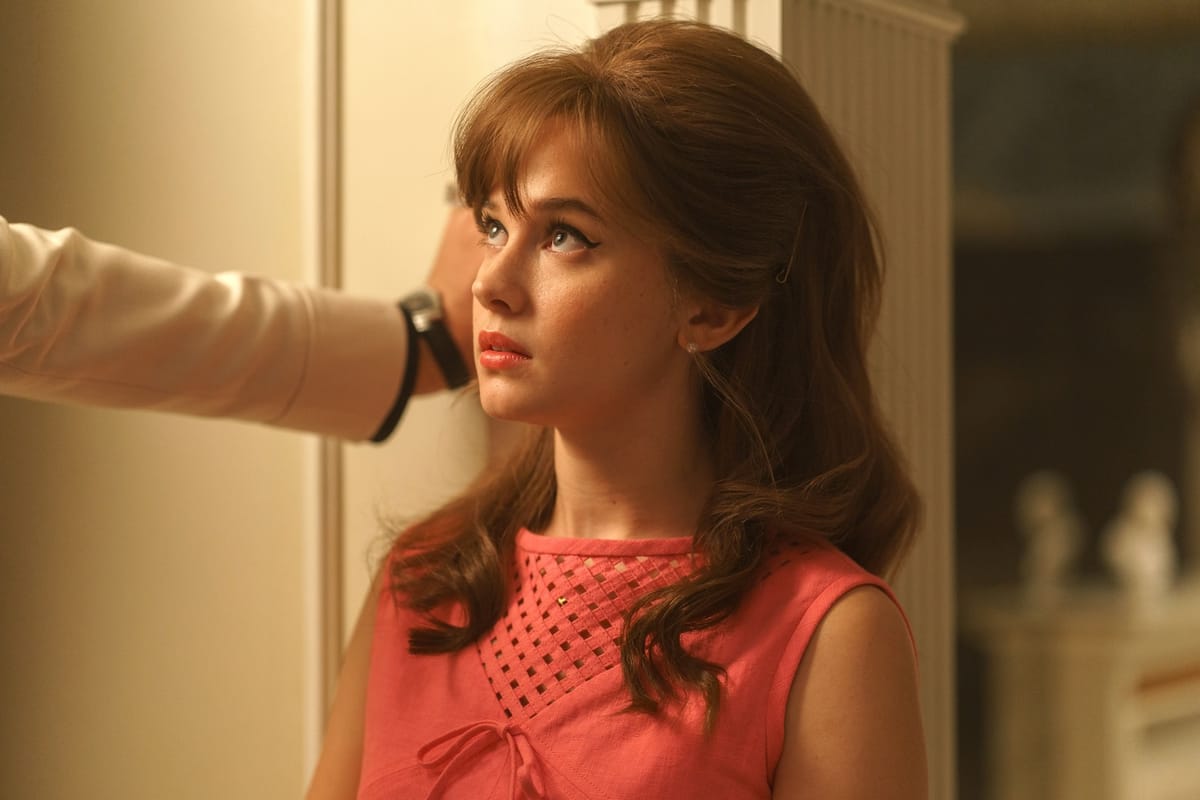Film Society x The Student: “Priscilla”
Sofia Coppola’s newest film, “Priscilla,” showcases the filmmaker’s strengths while falling flat in the second half. Managing Arts & Living Editor Sophie Durbin ’25 reviews the film, which, at times, plays into tired biopic tropes.

“Promise me you’ll stay the way you are now,” Elvis Presley, the 24-year-old King of Rock and Roll, says to his 14-year-old girlfriend Priscilla Beaulieu as he leaves her behind on a military base in Germany.
Sofia Coppola’s latest film, “Priscilla,” portrays the iconic couple’s relationship as founded on Priscilla’s promise to forever remain a blushing schoolgirl.
The first 20 minutes of the film contain everything I love in a Sofia Coppola movie: A killer soundtrack, lush and feminine visuals, the unparalleled thrill of being a girl with a crush.
We are introduced to a young Priscilla (Cailee Spaeny) not long after her family moves to an Air Force base in West Germany. She is lonely, homesick, and bored. A glimmer of hope arises, however, when she is invited to a party hosted by world-famous rockstar Elvis (Jacob Elordi), who happens to live minutes away from her.
Priscilla’s teenage years, which make up the first act, provide the film’s most compelling moments. Coppola is an expert at depicting the inner lives of teenage girls, whether they live in 18th-century France or 1970s suburban America, and Priscilla’s is no exception.
The film chalks up the controversial beginnings of Priscilla and Elvis’ relationship to innocent infatuation. Although Elvis’ intentions may have been less than pure, the film portrays Priscilla as a quiet and melancholy ninth-grader who comes alive only after she develops a crush on Elvis. Usually soft-spoken and insular, she begins to show agency and teenage indignance when her parents try to stop her from seeing Elvis.
Coppola makes sure to answer the question we’re all wondering: Why would Priscilla’s parents allow her to date Elvis? The film portrays the Beaulieus as caring and concerned parents. They aren’t irresponsible or fame-seeking — they reluctantly allow their daughter to continue seeing Elvis because he is the only source of happiness in her new life. Priscilla also gives them little choice: She is completely obsessed with Elvis and pleads with her parents to let her date him.
Even in the 1960s, the film shows, Priscilla and Elvis’s age gap was never normalized. Their relationship faced scrutiny from those close to them and the tabloids.
Priscilla’s youth is always evident but becomes glaringly apparent when she returns home after visiting Elvis for the first time. Without her parents’ permission, the couple visited Las Vegas, where Elvis began to mold her into his ideal woman. “Black hair and more eye makeup,” he growls. When her parents pick her up from the airport, they are shocked to see their daughter’s new appearance. Teetering in her towering stilettos and scowling at her parents’ reaction, Priscilla looks like a little girl who broke into her mother’s closet to play dress-up.
Throughout the film, Priscilla appears painfully girlish in comparison to Elvis. This contrast is exaggerated by the leading actors’ height difference. In real life, Elvis was 6 feet tall and Priscilla was 5 feet 4 inches, but in the film, the 5-foot-1 Spaeny appears even shorter next to 6-foot-5 Elordi. (Although the height difference is still obvious, the two actors worked hard to minimize it while shooting. Spaeny often stood on crates and Elordi perfected his “lean” for the movie). And thanks to Spaeny’s youthful features, Priscilla never appears to exceed 14, the age at which we first see her. Elvis wanted her to stay a little girl, the film seems to say.
After Priscilla arrives at Graceland, however, her individuality diminishes and she gives up her status as the main character. Her sheltered and loving childhood ends the moment she moves in with Elvis and becomes obligated to humor his every whim and care for him in an almost maternal capacity.
Soon after she arrives, Elvis sends Priscilla up to his bedroom and leaves her to explore his man cave alone. The camera pans around the room, revealing a murky den of leather, velvet, and tightly sealed curtains. (Elvis was famous for keeping the curtains shut in his room at all times.) The departure from Priscilla’s bedroom in Germany — a feminine and age-appropriate haven of pink pastels, floral wallpaper, and magazine clippings — could not be more obvious.
The film’s rendition of Graceland as a fortress designed to contain Priscilla lends a fairytale-like quality to her new life. Like Bluebeard, Elvis has spirited her away from her parents to his gothic abode. She continues to attend high school while living in Graceland but occupies an alternate reality when Elvis is home. While other girls at school worry about grades and boys their own age, Priscilla lives essentially as a child bride.
Elvis’s bedroom becomes an important setting in “Priscilla” and exposes the nature of the couple’s relationship. He initially keeps her a secret from the press and hides her away in his house, limiting their interactions to the privacy of his room.
Nonetheless, they rarely do more than talk in bed before marriage. Elvis worships Priscilla’s purity and frequently turns down her advances, to the point that she questions if he even desires her. Although his restraint with Priscilla seems to contradict his public image as a sex symbol, his behavior makes perfect sense. He designates Priscilla as emotional support and seeks physical relationships with other women. Priscilla recognizes this to an extent, telling her parents early on that he “just needs somebody to talk to.”
Coppola captures teenage Priscilla perfectly. But adult Priscilla, not so much.
Beginning with Priscilla’s marriage to Elvis, which passes just as quickly as it arrives, the film speeds through every major event of Priscilla’s life. Coppola falls into the classic biopic trap — too many events, not enough time — and leaves the second half of the film feeling rushed.
As the brief six years of her marriage to Elvis pass by, Priscilla grows increasingly distanced from the viewer. Her inner thoughts and desires become a mystery.
The film’s sudden impersonality is compounded by an eerie sense of timelessness. Although Priscilla’s hairdos and personal style mark the passage of time, she appears perpetually 14, just as Elordi’s Elvis maintains his slim figure and escapes the ravages of time. The couple appears to play older versions of themselves instead of actually aging.
I struggled to follow the film after this point. I began to see Spaeny and Elordi as the actors they are and couldn’t suspend my disbelief. As a longtime Sofia Coppola fan, I was disappointed that her signature storytelling takes a back seat. The film checks off events in Priscilla’s life with mechanical efficiency as if selecting each scene from a pre-approved list. I had a lingering feeling that Coppola may not have been able to exercise her full artistic license.
Coppola seems to subvert the film’s initial coming-of-age arc here: Instead of growing up, Priscilla loses her personhood. Elvis subsumes her into his existence and she loses sight of herself. Yet, Priscilla surely still had thoughts of her own, and we never get to see them. She loses the relatability that made her younger self so compelling.
Coppola may have purposefully created this distance between Priscilla and the viewer. Priscilla is still alive, after all, and only she can truly tell her story. But the same can be said about the subject of any biopic, and the cool detachment of “Priscilla” makes the film feel lacking in comparison to the visceral, if overwhelming, emotions of Baz Luhrmann’s “Elvis.”
Unlike Coppola’s 2006 film that humanized the notorious Marie Antoinette, “Priscilla” is restrained by its factual accuracy. It works too hard to retell events exactly as they happened and avoids presenting a unified story of Priscilla’s life, rendering “Priscilla” more reenactment than film. I wish Coppola had taken more artistic liberties.
The film ends abruptly as Priscilla drives out of the gates of Graceland for good after divorcing Elvis. It’s a touching scene, made bittersweet by Dolly Parton’s “I Will Always Love You” playing in the background.
When the end credits began to roll, other moviegoers at Amherst Cinema audibly groaned. “It’s already over?” I heard someone ask. I felt the same dissatisfaction: the film had not finished telling Priscilla’s story. There was too much left untouched and unsaid.




Comments ()